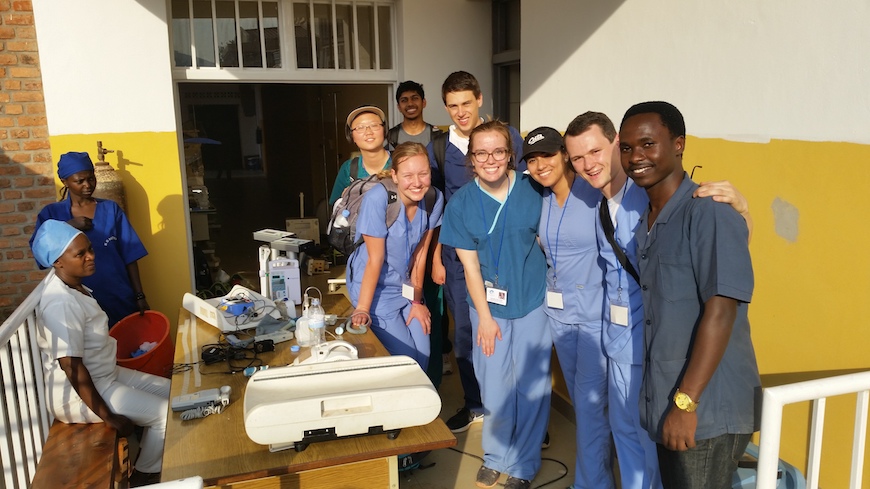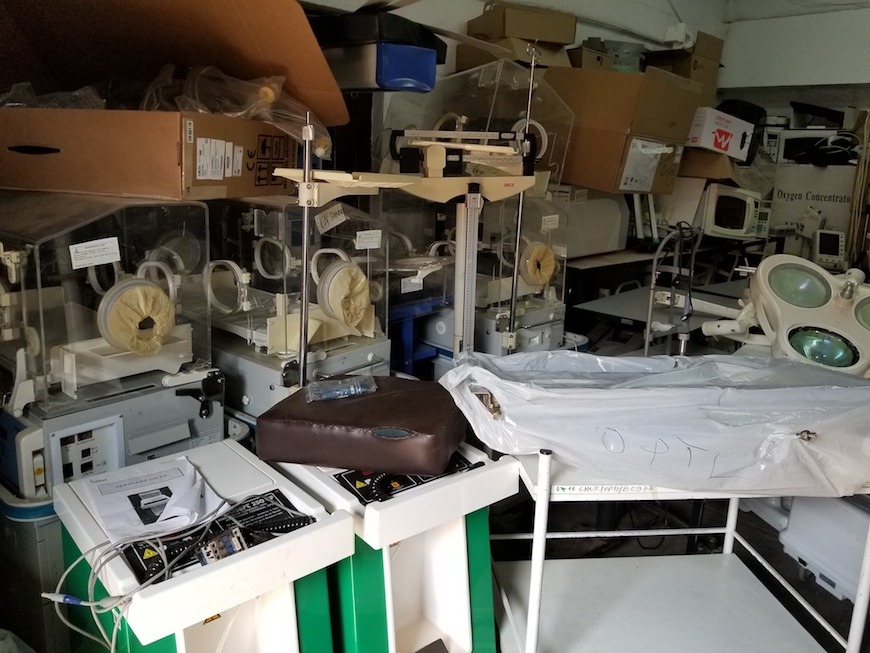 For engineering students in search of humanitarian work while studying abroad, Engineering Rwanda offers both and more.
For engineering students in search of humanitarian work while studying abroad, Engineering Rwanda offers both and more.
“Not only are you taking classes and immersing yourself in another culture, you are getting applicable work experience. It is also unlike any other study abroad, because not only are you benefitting from being in the country, but you are giving back to the country in a very tangible way,” said junior biomedical engineering major Taylor Boles, who participated in the 2017 summer program.
The Texas A&M University College of Engineering works each summer with Engineering World Health (EWH) to bring more than 20 students to Rwanda for two months to assist with a serious problem in the medical community — rooms filled with inoperative medical equipment in need of repair so that it can be returned to service in local hospitals.
“There’s this huge backlog of equipment that needs work, and critically limited local manpower to do the work,” said Dr. Michael Moreno, assistant professor in the Department of Mechanical Engineering and program coordinator. “We’re not working on medical devices that you would implant in a patient. Rather, we’re working on medical equipment that is primarily used for diagnostics, patient monitoring or patient maintenance, so all engineering students can benefit from the program.”
 Moreno said the training and experience acquired makes the program an excellent alternative to a summer internship or co-op. One common piece of feedback he receives from participants is that the program is a life-changing experience.
Moreno said the training and experience acquired makes the program an excellent alternative to a summer internship or co-op. One common piece of feedback he receives from participants is that the program is a life-changing experience.
“They will get a sense that they’ve made a substantial contribution to solving a problem,” Moreno said. “As an undergraduate engineer, you might question what you’re really capable of doing. Through this program they’re going to be confronted with problems that they will definitely be able to solve, and they’re going to feel a personal sense of accomplishment.”
For the first month, students train in Kigali, Rwanda’s capital city. Students stay with locals in homes near the campus, many of which don’t even have running water.
“The students learn right away that they’re not in the U.S. anymore,” Moreno said. “I think a lot of them actually like that because it’s real, it’s a genuine experience abroad to a resource-limited country. [In Rwanda] it’s a whole other kind of experience.”
Though resources are limited, there are shops and restaurants in Kigali that will offer familiar items. And cell phone and internet service can be found, though it is not as reliable and widespread as it is in the U.S.
In class, Moreno and his teaching assistant train students on the medical equipment and how best to troubleshoot common problems. Once a week, students visit hospitals in Kigali, and Moreno educates students on why there is so much obsolete equipment, most of which is donated.
“That became the problem, because they’re essentially getting rid of obsolete equipment by giving it to this country thinking, ‘Well, here you can use this.’ The reality is they could, but since it’s no longer supported there’s no spare parts for it, there’s no manuals,” Moreno said.
In the second month of the program, students are deployed in teams of two into hospitals in other, more rural parts of country, where they work with locals that have been trained as technicians.
“If we were not there the work would not be completed,” Boles said. “The technician in our hospital worked very hard, but he had so much administrative work to do that he rarely had time to fix equipment or train the staff on the equipment.”
Along with fixing equipment, students are expected to identify opportunities to design a solution to a problem, whether it has to do with the medical equipment itself or ways to make work at the hospital more efficient.
“Our first project was designing and building a rack for oxygen cylinders so they would not fall over, which can be really dangerous,” Boles said. “Our second project was installing hand sanitizer dispensers around the hospital, which was needed because often doctors would not even wash their hands before meeting with a patient.”
Boles said the problem solving and independence skills he gained and refined will help him as he moves forward with his career.
“We were forced to fix equipment with very limited resources so we often had to improvise solutions,” he said. “We often had to think outside the box to fix the equipment. I think that this experience with creative problem solving will help me in the future to solve problems.”
Outside of work, Moreno said students are free to pursue other activities. Boles participated in a safari, visited a rainforest and hiked volcanoes, among other trips. Moreno said Rwanda is one of the most politically stable countries in Africa, with one of the fastest growing economies, and is accommodating to international visitors.
Students can earn two courses worth of credit through the program. The 2018 program is from June 3-Aug. 5, and Moreno said considerable financial aid is available through Texas A&M and EWH. For more information, email Moreno at michael.moreno@tamu.edu.